DUNKI: THE PERILOUS PATH TO EUROPE
- 30 Mar - 05 Apr, 2024
My ex-colleague Sarah once had a ‘stalker’ – a 31-year-old guy she had casually met at a seminar. That very evening the unsuspecting gentleman sent her a request on Facebook, which she didn’t accept. Days later she began to receive unsolicited calls and good morning messages, jokes and irrelevant texts from multiple numbers. Here is how one phone call conversation went like, “Salam, humari uss din health seminar pe mulakat huwi thi. Mein, Humayun.” How did this Humayun get her number and her work details, a perplexed Sarah inquired to his nonchalant reply of “woh itna masla thodi. Ap LinkedIn pe bhi ho na.”
When a bothered Sarah narrated the incident to co-workers, she received a spectrum of responses. Two guys guffawed, one shrugged it off. Two girls began chatting about meeting with a similar dude in a XYZ place and oh boy, how he flirted with her. A supervisor showed concern, asking her to change her settings on her socials. But most failed to see the incident as a sheer unethical and possibly incriminating case of stalking. “Maybe he liked you and wanted to befriend you,” said another guy, adding a cherry atop the mess.
Another incident which landed a seismic shift to how I’d see the internet for years to come was in 2012. Azikah* was the prettiest (and then as if naturally) the most popular senior in school. One day we heard a buzz – someone had leaked intimate pictures of her, plastering it all over her Facebook ‘wall’ to her display and her cover image. And indeed, as I went home and fired up my Facebook on my Pentium 3, there they were… images, all over her profile, together with a blurred face of a man. The verdict was that she had a fight with an ex, who later leaked compromising images of her and changed her account’s password so that they couldn’t be taken down. The haaww-hayee comments and prophecies lasted weeks and later dried up, but Azikah* and her sixth grader sister never came to school after that.
Incidents, there are many. Acts of online harassment, breach of individual’s privacy, stalking and many more devils have become insanely common on the internet. We have seen so many cases of honour killing where women have been brutally murdered for posting a mere selfie online or cases where women have committed suicides on being blackmailed with photo-shopped selfies.
Other forms of harassment vary from bullying through simple name calling and trolling, quick character assassination for having a voice to persistent stalking and shaming to outright sexual and death threats.
Patriarchal figures, a whole new burgeoning age of misogynists and abusers, now have unrestricted access to disrupt women on vast territory; the internet. Women rights activists have more on their plate as compared to their predecessors – they are not just fighting against domestic abuse, eve teasing and harassments, they are fighting to make the internet safer for women.
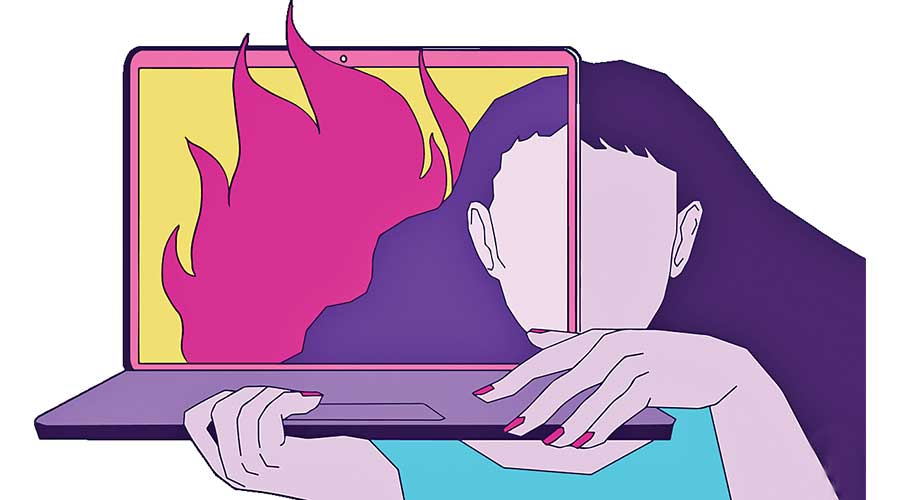
We sat down with experts to get their take on the dangers women with access to the internet are exposed to. If we are to scale these, which are the most alarming?
“I think one of the biggest challenges Pakistani women face in the online world is to ensure their privacy and safety since most of the women use devices which are shared with other family members,” says Nighat Dad. “Even when the devices are not shared, male authority figures of the family assume it routine, to monitor or have access to women’s devices – they are more commonly referred to as ‘family’s devices’. Even if women put passcodes to their devices or apps, it automatically invites the question, “what is she trying to hide from us?”
Feminist and group admin of country’s famous Facebook group, Soul B, Rabeeya S. Latif says, “A lot of it revolves around how demeaning men can be towards women. Reading through the hostility they channel and reading what men do to women who disobey, I think that makes for the real danger women face.”
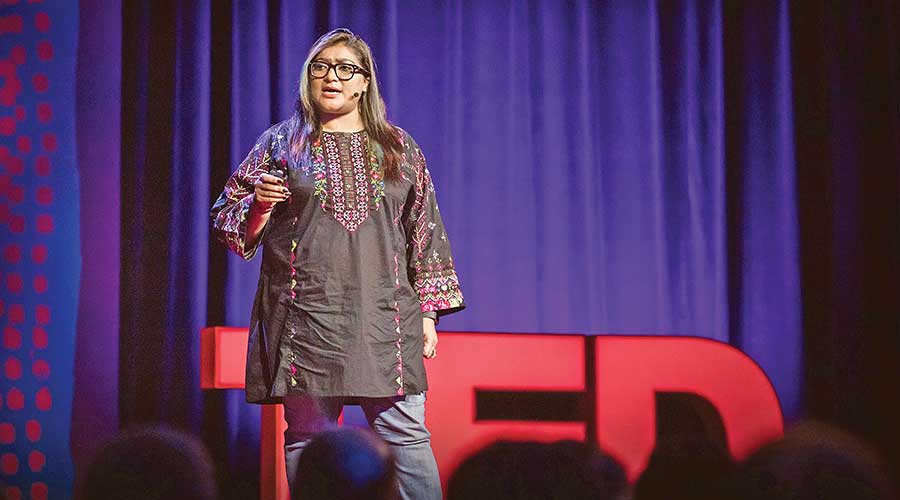
“Internet will only become a safe space for women when they will rightfully claim it and make it safe for themselves. This is not an easy task to accomplish while living under such tight surveillance from a family or the State.”
– Nighat Dad, Pakistani lawyer and Internet activist who runs the not-for-profit organisation Digital Rights Foundation.

“When we are talking about how we feel and what we are going through, on a safe space men feel the right to call us names, threaten us and breach our privacy.”
– Rabeeya S Latif, feminist and founder of social support group Soul B.
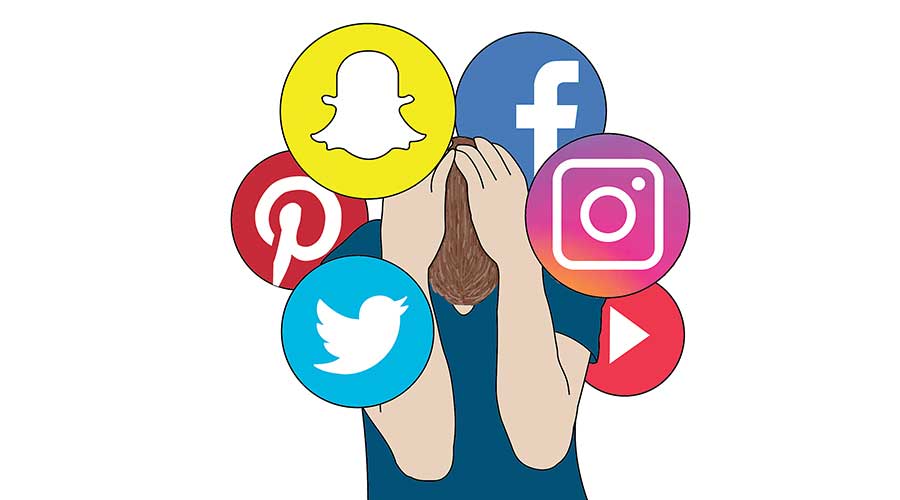
We are living in the age of screenshots – do you think it is a deterrent in giving women their privacy? Dad weighs on the pros and cons of taking ‘screenies’, “While we always stress that one must be very careful of what they are posting online or how much information they are giving to other people in their online conversations, there is always a threat of being screenshotted and blackmailed with later,” she says. But she also rakes in the power of screenshots in aiding women to document their incidences of harassment and gather evidence against their perpetrators.
Running a diverse, all-women’s group is tough, particularly when you try to protect people’s privacy, admits Latif. “We try to explain to our members that this is a safe place for them to interact but if any screenshots slips out, it becomes a breach of privacy. It really messes with people,” she says. “Girls are scared to open up to even the closest, well-knit circles. But how do we ensure that no screenshots are taken, what can we do? Even if you are WhatsApping, one can screenshot, screen record, possibilities are many. This makes it tough for women to be able to tell their story, or open up because they are always scared for their reputation in the society,” laments Latif.
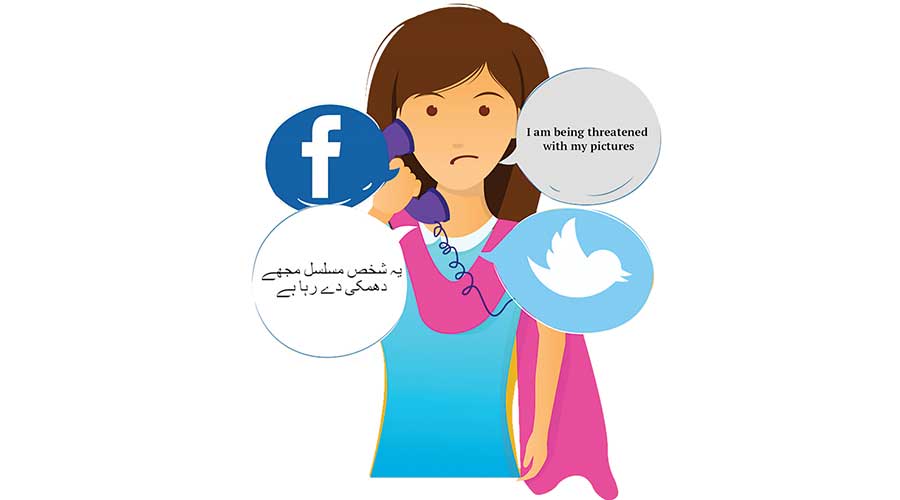
“Most women will not go ahead and report a ‘nominal’ incident which threatens their online safety. What are some of the red flags which are not to be ignored, after which an incident must be duly reported?
“Mostly, nominal incidences of harassment are ignored and the victims simply disengage and block the perpetrators but if the perpetrator has your private information – be it in the form of images, videos or any form of information about you and is threatening to upload it without your consent or harm you in any way by misusing it, take it as a red flag and report it immediately,” says Dad. “Sometimes, if the perpetrator has too much information about you like an address etc. and you think they have the tendency to cause physical harm in addition to violation of online safety, report it to the LEAs immediately.”
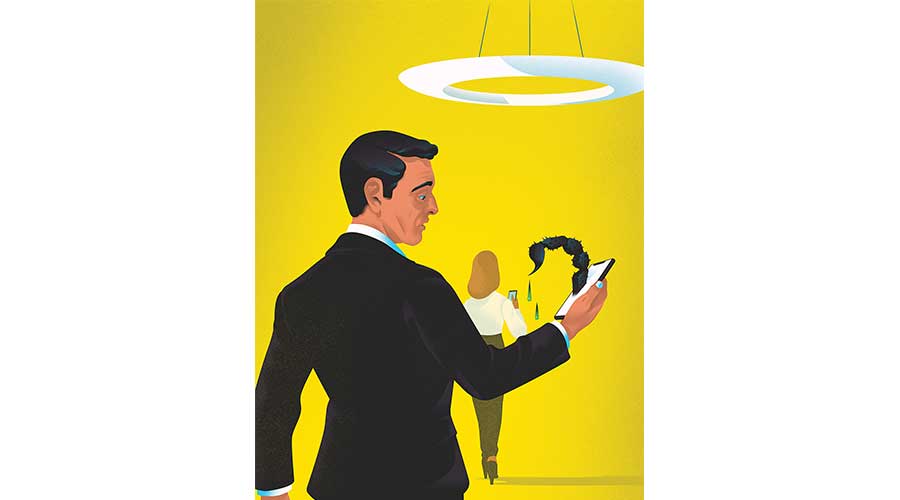
Caution #1 Remember, you have the choice to engage or disengage with people online
Dad reminds women; you have the right to use the internet and also have the choice to engage or disengage with people online. Never feel weird declining friend requests from people you barely know. You get to choose who stays on your friend list.
Caution # 2 Be more mindful of what you post online
Always be more cognizant and mindful of what you post online. But if something feels wrong or someone's making you uncomfortable, and if you think the threat of being posed is real, do not shy away from going to LEAs. “The problem is with the structure; men harass and coerce women because they think they are allowed to do that or they’ll easily get away with it,” stresses Dad.
Caution # 3 Mind your privacy settings
Almost all social networking sites have underlined some pre-emptive and protective policies to ensure users’ online safety and privacy. Although, there is always a default privacy setting in every app but that is not sufficient and it is always advised that the user put forth the effort to make changes and alter the privacy settings to block strangers and people who are not friends to view your private information.
Caution # 4 Tape your webcam
There are too many apps capable of turning on your camera and slyly recording your movements without your knowledge. As a precaution, disable camera permission and keep the lens of your camera closed or covered when not in use.
Caution # 5 Be digitally literate
Digital literacy is basic key to take the precautionary measure to stay safe from hacking and phishing attacks: set strong passwords, two factor authentication and updating privacy settings to your own choice adds layers to your online safety.
Caution # 6 Trust your instincts’, woman
When it comes to safety, both online and offline, common sense is the first line of defense. Your instincts play a critical role in your protection. If something feels ‘off’, go with your instincts. You don’t have to explain your reasoning to anyone.
COMMENTS